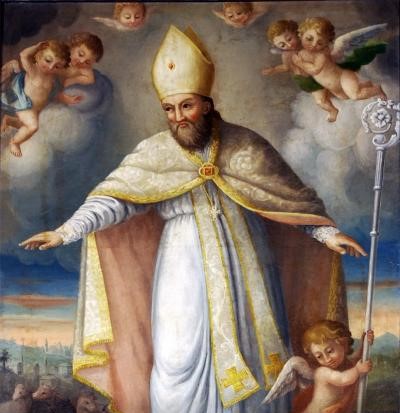
Saint of the Day for 13 January: St. Hilary of Poitiers
St. Hilary of Poitiers: Pillar of the Faith and Defender of Orthodoxy in the Early Church
Name
St. Hilary of Poitiers
Title
Bishop and Doctor of the Church
Birth
c. 310, Poitiers, France
Death
368, Poitiers, France
Recurrence
13 January
Martyrology
2004 edition
Prayer
Grant, O Lord, like the example of our beloved Hilary, that I may always hold fast to what I professed in the Symbol of my regeneration, when I was baptized into the Father, the Son and the Holy Spirit. May I worship you, our Father, and together with you your Son; may I merit your Holy Spirit, who proceeds from you through your only begotten Son. Amen
Patron saints of
Argusto, Parma, Casorate Sempione, Ossona, Beregazzo con Figliaro, Bedero Valcuvia, Vervio, Cassinasco, San Ponso, Strambinello, Nus, Gignod
Roman Martyrology
Poitiers, France, the birthplace of St. Hilary, Bishop and Confessor, who, for strenuously defending the Catholic faith, was relegated to Phrygia for four years, and, among other miracles, raised a dead man there. Supreme Pontiff Pius the Ninth declared and confirmed him a Doctor of the Universal Church.
The Saint and Mission
The figure of St. Hilary of Poitiers stands as a beacon of dedication and clairvoyance in the history of Christianity, especially when one contemplates his approach to mission. In the heart of the fourth century, a turbulent time for the Church, Hilary emerged as an ardent defender of the Nicene faith against the currents of Arianism, a task that went far beyond mere theological polemic and was deeply rooted in a mission of truth and enlightenment. What makes St. Hilary’s mission unique is his balanced and reflective approach. He did not simply dismiss heresy, but actively sought to understand its origins and respond with a solid and accessible argument. This methodology was not only a defense of orthodox doctrine, but also a way to guide others to a deeper understanding of the faith. Moreover, his existence was marked by a constant commitment to the edification of the Church. Exiled for his faith, Hilary never lost sight of his mission, using his time in exile to write influential works that continue to inspire Christians today. His ability to turn adversity into opportunity is a key aspect of his mission. Ultimately, the life of St. Hilary of Poitiers teaches us that true mission goes beyond the mere defense of doctrine; it is a journey of constant search for truth, deep understanding and sharing this truth with others in ways that enlighten and enrich the entire Christian community.
The Saint and Mercy
St. Hilary of Poitiers emerges in Christian history as a striking figure, especially in his approach to mercy. Living in the fourth century, at a time of intense theological debates and divisions within the Church, Hilary distinguished himself not only by his keen theological intelligence but also by his profound sense of mercy. St. Hilary’s mercy manifested itself in multiple ways. First, it was evident in his unwavering commitment to defend the faith against the Arian heresy, not only as a doctrinal battle, but also as an act of mercy toward those who were led astray by erroneous teachings. He understood that guiding people to the truth was a supreme act of mercy, as it freed them from spiritually harmful errors. Moreover, St. Hilary showed mercy through his patience and ability to dialogue with those who opposed him. Rather than resorting to scathing condemnations or rigid isolation, he sought dialogue and teaching, evidencing a deep understanding of the value of compassion and understanding in dealing with error. His life and ministry offer a powerful example of how mercy can be lived out in contexts of doctrinal and spiritual conflict. St. Hilary teaches us that mercy is not only a feeling of compassion, but also a courageous and determined action to guide others toward truth, in respect and love.
Hagiography
Hilary was born in Poitiers, in the bosom of paganism, to one of the most distinguished families of France. Here is how his conversion took place. He set himself one day to read the Holy Bible, and coming to the words, “Ego sum qui sum: I am He who I am,” he was greatly impressed. He continued reading and enlightened about the omnipotence of God, he bent his mind to worship Him as his Creator and Lord. Being so disposed, he received Holy Baptism. He then modeled his life after the maxims of the Gospel, and was so zealous in urging others also to the practice of the virtues, that he would be called a priest. The people of Poitiers so admired him that they unanimously elected him their own bishop, despite all his grievances. After the election, he regarded himself as no more than a man of God, and preached with tireless zeal, moving sinners to conversion. He was full of reverence for the truth, and was ready for anything when it came to taking up its defense. The Emperor Constantius having assembled a council in Milan for the condemnation of St. Athanasius, St. Hilary wrote him a book in which he tried to persuade him to let the Catholics be free to exercise the Christian religion with their bishops, and…
